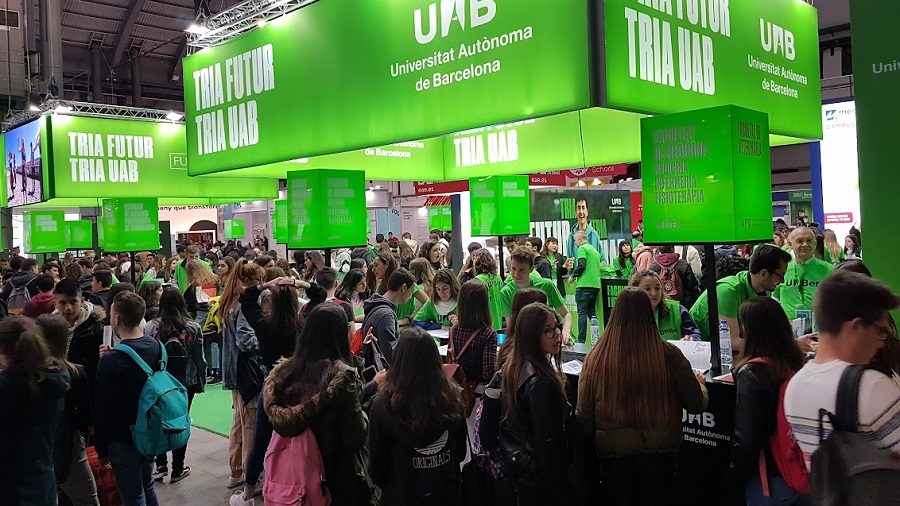The UAB presents its academic programmes at the Barcelona Education Fair
From 15 to 19 March, the UAB will be present at the Barcelona Education Fair, the Saló de l'Ensenyament, to inform prospective students about the bachelor's degrees and university services available for the university community. The UAB will be located at Pavillion 1, Stand B237 of the Barcelona Fair at Montjuïc. Some 50 UAB students and lecturers will be available to inform students on the degrees available at the UAB in a sustainable and more ample environment than in other editions. The UAB will also be present at the Science Area, where it will organise activities related to journalism, prehistory, chemical engineering and sociology.

The fair will be open from 9 a.m. to 7 p.m. on Wednesday, 15, Thursday 16, and Friday 17 March. On Saturday 18 March, opening hours will be from 9 a.m. to 8 p.m. And on Sunday 19 March, the Education Fair will be open from 9 a.m. to 2:30 p.m. Our UAB students prepared to inform visitors will be using tablets, leaflets and bookmarks with QR codes to help reduce the use of paper as much as possible. In addition, the stand is 25 square metres larger than last year's and comes equipped with more ergonimic and sustainable furniture.
With regard to the academic offer of bachelor's and master's degrees, this year the Education Fair does not coincide with the postgraduate fair Saló Futura, but the UAB has decided to organise online fairs to inform students about the master's degrees, postgraduate diplomas and PhD programmes being offered. The next edition of these online fairs will be held in May.
At the same space as the Education Fair, the Catalan Research and Innovation Foundation has organised a Science Space, an area in which visitors can take part in a variety of scientific workshops and demonstrations. UAB lecturers will be directing some of the activities on offer: the Department of Prehistory and the archaeobotanical laboratory will organise a workshop on plant remains appearing in archaeological sites; the Composting Research Group (GICOM) will talk about making the most of waste generated by the food and cosmetic industries; lecturers from the Department of Sociology will explain the Refuge-ED project for the dynamic integration of migrant and refugee minors; and members of the Department of Journalism and Communication Studies will direct a workshop on a critical comprehension of the media and disinformation.
New programmes for the next academic year
In the 2023/24 academic year, two innovative degrees offered by the UAB, the bachelor's degree in Socio-Cultural Gender Studies and the bachelor's degree in Management of Smart and Sustainable Cities, will go from 180 ECTS credits (three academic years) to 240 ECTS credits (four academic years). This change will be applied in accordance with Royal Decree 822/2021, which allows for a two-year margin in the transformation of official, three-year bachelo'rs degrees to official four-year bachelor's degrees. The same change has also been made in the bachelor's degree in Bioinformatics, jointly offered by the UAB, UB, UPC and UPF. In addition, next year the UAB will renew the study plans of three more bachelor's degrees: Nanoscience and Nanotechnology, Archaeology and Environmental Science.
The bachelor's degree in Socio-Cultural Gender Studies is the first programme of this type to be offered within the Spanish university system. Since the 2018/19 academic year, the UAB had offered it as a three-year degree, but thanks to changing it into a degree worth 240 ECTS credits, the more instrumental and professionalising contents in the study plan were intensified and other contents such as data analysis and the creation of equality plans for businesses and the administration sector were also added in.
The bachelor's degree in Management of Smart and Sustainable Cities is also a pioneering academic programme in Spain and has been offered since the 2017/18 academic year. Now worth 240 ECTS credits, the UAB has increased the applied orientation of the degree by reinforcing first-year engineering courses (mathematics and computer science), incorporating new subjects on sustainability and urban management (social, political and economic), and fostering challenge-based learning.
The inter-university bachelor's degree in Bioinformatics is offered fully in English. Students learn to develop their professional capacity in processing, visualising and analysing a large amount of biological data in the fields of medicine, agriculture and the food industry. Career options include data management for the development of new drugs and the integraton of omics data (related with genomics) for the development of personalised medicine.
The UAB has also renewed the study plans of three bachelor's degrees with the aim of updating their contents in accordance with the evolution of the professional sector, social challenges and technological advances: the bachelor's degree in Archaeology, which fosters applied archaeological contents and adapts new technologies and methodologies used in the discipline; the bachelor's degree in Environmental Science, which delves into the training of professionals capable of managing environmental problems in both the business and the public administration sectors; and the bachelor's degree in Nanoscience and Nanotechnology, which introduces new skills and abilities, particularly in programming methods and applications, data treatment and synthesis of material properties.
The UAB, with Sustainable Development Goals
Quality education